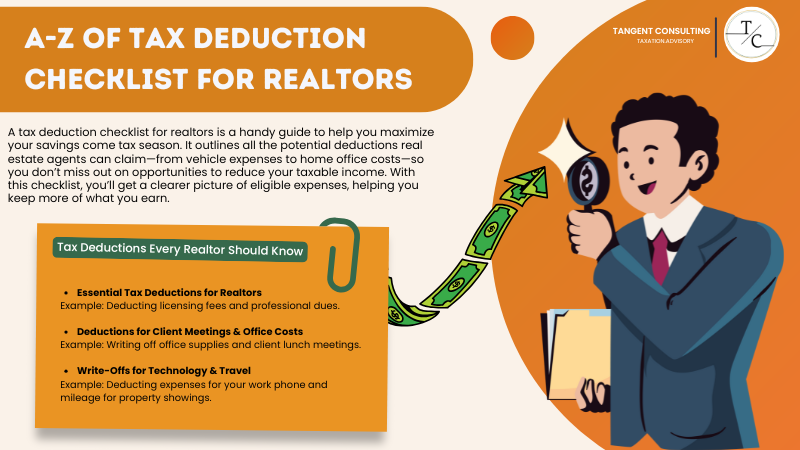The A – Z of Tax Deduction Checklist for Realtors
The A – Z of Tax Deduction Checklist for Realtors

“Did you remember to include your phone bill in this year’s deductions?”
“Wait… we can deduct that?”
“Yep! And don’t forget the mileage, the home office setup—oh, and all those coffees with clients!”
This is a general conversation between two realtors during tax season. One person knows a lot about tax deductions. If you are in that category, you can take off and not read this guide.
But if you are the other person, who doesn’t know a lot about tax deductions, this guide is for you.
We have compiled a tax deduction checklist for realtors in the US and Canada to help you keep more of what you earn. So, let’s start.

Why are Tax Deductions Important for Realtors?
“The hardest thing in the world to understand is income tax.” – Albert Einstein
If one of the brightest minds to ever live couldn’t understand taxes, then real estate agents can be excused for holding their breaths as tax season draws near.
But here’s the thing: understanding taxes is one of the most powerful tools a realtor can have. Why? Because taxes can make or break your income.
The Impact of Deductions on Your Annual Income
Every dollar saved through deductions is one less dollar the government takes in and, instead, adds to the dollar in your bank.
Knowing about deductions ensures a solid financial floor for realtors whose income fluctuates. Tracking eligible deductions and applying for them can reduce taxable income while increasing take-home pay.
For instance, you have $5,000 in deductible expenses. Imagine what a tax reduction would mean to your business. When multiplied by a year, that is a lot of money saved. This money can be reinvested into your business, funding new marketing ideas, thus helping you secure more listings.

Knowing Your Deductions Can Save You Time
It can be a horror show, scrambling around at the last minute looking for receipts or missing deductions because you didn’t keep the records.
BTW you can check the story of Batcave Construction, which had a shoebox full of receipts.
Staying on top of deductions throughout the year prevents most of the last-minute stress that is associated with tax season.
Unique Deduction Opportunities
Even though the US and Canada have similar lists of deductions that apply to realtors, each country has unique opportunities.
The Qualifying Business Income deduction provides a tax exemption to US realtors on taxes resulting from qualified income. Realtors in Canada use Capital Cost Allowance on properties, which lets you deduct depreciation on certain assets such as office equipment.
Speaking of deduction opportunities, do you know you don’t have to pay sales tax when buying a house in the US?

Tax Deduction Checklist for Realtors
It’s a common practice for real estate agents to spend 15% of their income on marketing and other business expenses. That’s a significant portion, which you can deduct.
With that in mind, here’s a tax deduction checklist for realtors in the US and Canada.
Home Office
We have talked to lot of small realtors and they say home office deduction proved game-changer for them. If you happen to have a dedicated home space, used regularly and only for business, you can make deductions on some home expenses.
In the US, you can deduct the percentage of mortgage interest, rent, utilities, and maintenance costs. According to the IRS, “The simplified option has a rate of $5 a square foot for business use of the home. The maximum size for this option is 300 square feet. The maximum deduction under this method is $1,500.”
In Canada, the CRA allows similar deductions based on the workspace size. For the self-employed realtor in Canada, home internet can also be claimed if you provide evidence of business use.

Office Supplies
Office supplies, from paper and pencils to large equipment such as printers and filing cabinets, are essential to keeping an office running. Fortunately, realtors can deduct office supplies.
All office supplies, printer ink, stationery, and even client folders are deductible in the US. Larger office equipment, like a computer or scanner, may have to be depreciated, but it is still a deduction.
For Canadian realtors, any items used solely for business, like printer paper, binders, or business cards, are deductible. Larger purchases, such as computers, may be claimed through the Capital Cost Allowance (CCA), which claims them over several years.
Auto Expenses
From client showings to house visits, there are several auto expenses for the realtor. Thankfully, the IRS and CRA provide auto tax deductions.
In the US, the auto costs are deducted through either the mileage rate, which is currently 65.5 cents per mile for 2023, or the actual expense method.
The mileage rate is straightforward and covers gas, maintenance, insurance, and depreciation. With the actual expense method, you track all of the costs—gas, repairs, insurance, and lease payments—and calculate the percentage used in business.
In Canada, the CRA allows tax deductions on car expenses. Realtors can write off fuel, insurance, maintenance, and even interest in car loans if the car is used for business purposes.
You would need very detailed logs, records of starting and finishing mileage, and receipts for car-related expenses.

Advertising
For realtors, advertising isn’t just an expense—it’s one of the important ways to attract clients and establish a reputable brand. You can deduct online ads, billboards, sponsored community events, and business brochures.
The policy in the United States is more open to deductions for advertising, whether it is online ads that include listings of properties or even just maintaining a website. You can also deduct business cards and signs.
Fees paid to advertise on Zillow or Realtor.com fall are also tax deductible. Finally, the cost of promotional events can be deducted if they are aimed at generating business.
The CRA also enables similar deductions for advertising, including social media ads, Google ads, printed advertisements, and direct mailers. This also means the costs of promoting from open houses or community sponsorship that promotes a real estate agent’s brand.
Canadian realtors can also include costs incurred in maintaining a website and the money spent on domain hosting, among other promotional tools for a realtor’s business.
Meals and Entertainment
It’s strange, but many of our clients ask us, “Is coffee deductible?”
Coffee, including business meals and entertainment, are deductible.
The IRS allows you to take a 50% deduction on meals related directly to a business, but they can’t be deemed lavish. Meals and entertainment were largely deductible in the past, but in the latest tax laws, meals are only deductible.
As of 2023, the CRA permits a flat rate of $23 per meal and a maximum of $69 per day per person. In Canada, like in the US, entertainment expenses, such as event tickets, are not typically deductible.
It’s important to note that keeping meal receipts is key for Canadian and US realtors.

Professional Services
Sometimes, you need a fractional CFO; other times, you may need a legal advisor. The good news is that professional services are deductible.
The IRS allows deductions on professional services related to the business, including accounting fees, legal consultations, and business coaching/ mentorship fees. Even services like software consulting or website management count if they are related to a business need.
In Canada, you can deduct professional services fees too. Like in the US, these fees must be specifically related to the business; advice or services that are completely unrelated to the business will not be deductible.
Tax deductions plus a free trial on accounting software sound like a match made in heaven. Thanks to our partnership with QuickBooks, you can get up to 80% off for six months. Oh, and it includes a 30-day free trial with no strings attached. So, grab a deal while it lasts.
Subscriptions
You are probably not watching Netflix while at work, and you may have signed up for many other subscriptions, such as market research reports or a real estate magazine.
Of course, the IRS deducts business subscriptions, which may include professional magazines, industry journals, and access to real estate platforms. Subscriptions for general publications are not deductible unless they can be directly traced to business use.
Canadian real estate agents can also claim industry-specific tools, including fees for real estate sites, market analysis applications, and professional publications. It’s important to note that these subscriptions should be directly connected with real estate activities rather than personal use.

Desk Fees
Desk fees are part of the deal for realtors working through a brokerage. These fees cover the brokerage’s operational costs, including office space, support staff, and other resources.
If Realtors are registered or affiliated with a brokerage, they can deduct their desk fees, franchise fees, and other expenses related to operations in the US. The IRS permits them only if these are properly documented and crucial for the Realtor to perform his or her business.
The CRA also allows the deduction of desk fees paid to a brokerage. Monthly office space fees, administration service fees, and other costs are exempt if they are business-related and paid to a brokerage.
Final Thoughts
We know knowing all tax deductions can feel like solving a trigonometric equation but with the deductions we mentioned above, tax season can be a time of valuable savings.
And remember, when in doubt, you can consult a tax professional who understands the intricacies of real estate.
The good thing is you don’t have to go to the bottom of the Pacific Ocean to find a tax pro. Tangent Consulting saves your taxable dollars by providing tax preparation and filing services, so you can sleep better when the tax season arrives.
FAQs
Is mortgage tax deductible in the USA?
You can deduct the interest you paid on the first $750,000 of your mortgage.
Is property tax deductible in Canada?
Property tax is not deductible for personal use. However, it may be deductible for business properties or certain rental properties.
